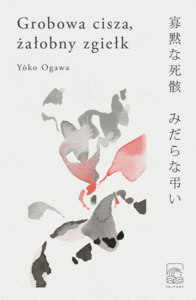You need to sign in or sign up before continuing.
Take a photo of a barcode or cover
challenging
dark
mysterious
reflective
sad
fast-paced
Plot or Character Driven:
Plot
Strong character development:
N/A
Loveable characters:
No
Diverse cast of characters:
Yes
Flaws of characters a main focus:
Yes
Dark, surreal and unrelentingly eerie.
Ogawa wrote this short story collection with a lot of care, going from character to character, leading the reader gently by the hand, placing them on top of a hidden trap door, and then pulling the lever.
The writing style changes with each narrator, suiting their personality. Sometimes the writing is golden, shiny and alluring, until you start to wonder what those little red splotches are... Don't worry about it! Other times, there's something off from the beginning, and you immediately feel oppressed by the atmosphere created in just a few lines. My favourite one was definitely the one about the bag maker. Creepy, beautiful and disturbing, a perfect October read.
The writing style changes with each narrator, suiting their personality. Sometimes the writing is golden, shiny and alluring, until you start to wonder what those little red splotches are... Don't worry about it! Other times, there's something off from the beginning, and you immediately feel oppressed by the atmosphere created in just a few lines. My favourite one was definitely the one about the bag maker. Creepy, beautiful and disturbing, a perfect October read.
dark
slow-paced
I really wanted to like this book but it was way too scattered, too slow, and too into its own voice. Speaking of which, avoid the audiobook at all cost - one of the readers is nails on a chalkboard.
dark
mysterious
reflective
sad
medium-paced
Lo leí en un día porque no podía parar. Las historias están conectadas por algunos elementos (una pastelería, un edificio, una noticia en el periódico, un hospital) y varias de las historias suceden en el mismo lugar, así que al terminar una sentía la necesidad de saber qué parte de esa historia aparecería en la siguiente. También, casi todas, están narradas por una mujer o tienen una mujer como figura principal.
Las historias de Yoko Ogawa son inquietantes y perturbadoras no porque existan monstruos o fantasmas en ellas, sino porque todo parece perfectamente normal hasta que sus personajes comienzan a abrirse un poco más; como si entraras a una habitación bien iluminada en la que todo está en orden, pero al poner atención notas que en una esquina hay un armario que se ve un poco raro, te acercas, y cuando abres la puerta solo hay mucha oscuridad. No hay una mano que salga para jalarte, tú solo quieres entrar para ver qué es lo que encuentras. Es un vistazo a ese espacio que todas las personas tenemos en la mente al que, por alguna razón, la luz no alcanza a llegar. Una caja negra en la que guardamos obsesiones, deseos de venganza, dolor por una pérdida.
Y por último: no sé por qué muchas reseñas comparan a Yoko Ogawa y en particular estos cuentos con Murakami, pero no les hagan caso porque no es cierto, para nada. Sospecho que eso se dice muy seguido de cualquier escritor japonés contemporáneo para vender sus libros traducidos, pero es que justo lo que me gusta del horror de Ogawa es que no usa tantos elementos mágicos ni de fantasía como pasa con Murakami y Banana Yoshimoto, que también me gustan, pero son muy diferentes. Si tuviera que compararlas con algo, diría que estas historias se parecen más al estilo de Mariana Enríquez (autora de "Las cosas que perdimos en el fuego").
En fin, me gustó mucho, quizá le sobran un par de historias pero en general es buenísimo, un laberinto del que quieres escapar porque es de noche y estás solo, pero al mismo tiempo te dan ganas de acostarte en el pasto para ver la luna, escuchar el canto de los grillos y simplemente esperar a que algo terrible ocurra.
Las historias de Yoko Ogawa son inquietantes y perturbadoras no porque existan monstruos o fantasmas en ellas, sino porque todo parece perfectamente normal hasta que sus personajes comienzan a abrirse un poco más; como si entraras a una habitación bien iluminada en la que todo está en orden, pero al poner atención notas que en una esquina hay un armario que se ve un poco raro, te acercas, y cuando abres la puerta solo hay mucha oscuridad. No hay una mano que salga para jalarte, tú solo quieres entrar para ver qué es lo que encuentras. Es un vistazo a ese espacio que todas las personas tenemos en la mente al que, por alguna razón, la luz no alcanza a llegar. Una caja negra en la que guardamos obsesiones, deseos de venganza, dolor por una pérdida.
Y por último: no sé por qué muchas reseñas comparan a Yoko Ogawa y en particular estos cuentos con Murakami, pero no les hagan caso porque no es cierto, para nada. Sospecho que eso se dice muy seguido de cualquier escritor japonés contemporáneo para vender sus libros traducidos, pero es que justo lo que me gusta del horror de Ogawa es que no usa tantos elementos mágicos ni de fantasía como pasa con Murakami y Banana Yoshimoto, que también me gustan, pero son muy diferentes. Si tuviera que compararlas con algo, diría que estas historias se parecen más al estilo de Mariana Enríquez (autora de "Las cosas que perdimos en el fuego").
En fin, me gustó mucho, quizá le sobran un par de historias pero en general es buenísimo, un laberinto del que quieres escapar porque es de noche y estás solo, pero al mismo tiempo te dan ganas de acostarte en el pasto para ver la luna, escuchar el canto de los grillos y simplemente esperar a que algo terrible ocurra.
dark
tense
medium-paced
Plot or Character Driven:
A mix
Strong character development:
Complicated
Loveable characters:
No
Diverse cast of characters:
Yes
Flaws of characters a main focus:
Yes
Moderate: Body horror, Murder
Minor: Child death, Torture, Suicide attempt
I can't find any fault with this book other than the translation of the title seems off.
Dark surreal interwoven stories that seamlessly flow from one to the next. Well thought out and twisting. A meditation on grief and loss. I will definitely be reading more by this author. Excellent.
Dark surreal interwoven stories that seamlessly flow from one to the next. Well thought out and twisting. A meditation on grief and loss. I will definitely be reading more by this author. Excellent.
There aren't any duds in this collection, but there also aren't any standouts. All the stories are linked, characters and events float between the different narratives and the themes link up like a little cobweb.
If it wasn't for this interconnectedness I would have almost nothing to say, thankfully the ripple effect of the moribund characters and ill-fated animals (and fruit) provide something deeper to the reading experience.
If it wasn't for this interconnectedness I would have almost nothing to say, thankfully the ripple effect of the moribund characters and ill-fated animals (and fruit) provide something deeper to the reading experience.






